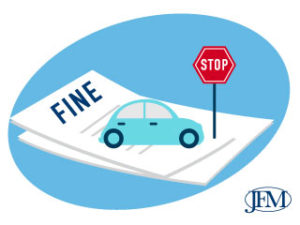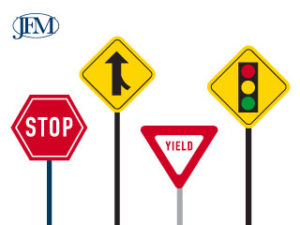Failure to Observe Traffic Signal (2 Point Ticket) Attorney
In the New Jersey Motor Vehicle Code (Title 39 of the New Jersey Statutes), “Failing to Observe a Traffic Signal”, pursuant to N.J.S.A. 39:4-81, is one of the more common point violations committed regularly. What may seem like a very minor offense for making a right at a no turn red light is actually a two (2) point violation. Failing to Observe a Traffic Signal in New Jersey can be very costly in terms of increased insurance costs, and will bring many people over the 12-point limit for a Persistent Violator suspension by the New Jersey Motor Vehicle Commission.
Penalties for Failure to Observe a Traffic Signal in New Jersey Cities
Failure to Observe a Traffic Signal under N.J.S.A. 39:4-81 is punishable by up to a $200 fine, and imprisonment up to fifteen (15) days in county jail. The fine doubles when the “Failure to Observe a Traffic Signal” takes place in a construction zone or 65 miles per hour zone. You also get two points on your license. If you already had six points on your license at the time you received the citation for failure to observe a traffic signal, then you must pay an additional $150 fine; the fine increases by $25 for each point you have on your license beyond the seventh. This fine recurs every year for three years. Points do not stay on your license forever, so there is more at stake with a failure to observe a traffic signal ticket if you have also received other citations in the past several years. A person’s license may also be suspended, both by the NJ Motor Vehicle Commission (accumulation of too many points) and by the judge due to the alleged conduct that led to the ticket. By contrast, it costs about $39 to contest a failure to observe a traffic signal citation, not including the cost of hiring a traffic citation defense lawyer.
In many circumstances, a skilled and experienced traffic ticket attorney can reduce N.J.S.A. 39:4-81 tickets to something that entails less, or even no points on a motor vehicle driver’s abstract.*
* Circumstances are different in every case, and the best way to determine what can be done would be to contact a traffic ticket attorney at 1 (877) 450-8301 for a free, no-obligation consultation.
What if The Driver Worked as an Employee at the Time of the Violation?
Technically, the owner or parent company of the vehicle is liable for the driving violation. This was established in State v. Gelman in 1961, where the court held that a licensee in whose company and under whose control permittee operated automobile was absolutely liable for permittee’s passing through a red traffic signal, regardless of whether licensee had failed to exercise proper control. 65 N.J.S.A. 600. Therefore, it is imperative that both the driver and the owner of the vehicle take adequate notice to properly handle any moving violations, including those for Failing to Observe a Traffic Signal, under N.J.S.A. 39:4-81.
What is the Law For Failure to Observe a Traffic Signal (2 Points) N.J.S.A. 39:4-81
N.J.S.A. 39:4–81, “Observing Traffic Signals”Effective: July 9, 2004a. The driver of every vehicle, the motorman of every street car and every pedestrian shall obey the instructions of any official traffic control device applicable thereto, placed in accordance with the provisions of this chapter, unless otherwise directed by a traffic or police officer.
b. When, by reason of a power failure or other malfunction, a traffic control signal at an intersection is not illuminated, the driver of a vehicle or street car shall, with respect to that intersection, observe the requirement for a stop intersection, as provided in R.S. 39:4-144.
What is a Traffic Signal and What is the Right Way to Observe One?
There are many different reasons that a police officer might issue a traffic citation, such as speeding, expired tags, or distracted driving. One of the most common reasons for traffic tickets is “failure to observe traffic signals and road signs.” In this context, a traffic signal is what you and I would call a traffic light. Therefore, failure to obey a traffic signal usually means running a red light, or occasionally running a yellow light. As for road signs, they can give all kinds of directions, but these are some of the most common road signs that drivers disobey, leading to traffic stops and citations:
- No turn on red
- No U-turn
- No passing
- Yield to merging vehicles
- No left turn
- Right lane must turn right
- Stay in lane
In other words, these signs tell you not to do things that are legal to do on most public roads. For example, it is legal to make a right turn at a red light, except when there is a sign telling you not to. Likewise, it is usually acceptable to make a left turn at an intersection if you are in the left lane; at intersections where this is not allowed, there will be a sign saying so.
One of the most potentially dangerous cases of failure to obey road signs involves running a stop sign. If there are not many other cars around and you are not driving faster than the speed limit, you could get a traffic citation for failure to obey a road sign. If there are exacerbating factors, such as if you are speeding or looking at your phone when you run the stop sign, you could face even worse penalties.
Should You Pay a Citation for Failure to Observe a Traffic Signal or Go to Court?
A $50 traffic ticket for failure to observe a traffic signal does not sound like much; you might think that missing a day of work to go to traffic court will cost you more than just paying the ticket. If you already have points on your license when you get the citation for failure to obey a traffic signal, then you will need to pay at least $450 in additional fees. Another cost related to traffic citations, whether for failure to obey traffic signs or anything else, is that it will cause your insurance premiums to increase, at least for a while. Your premiums will go back down after a few years if you do not get any additional tickets. The biggest reason to contest a traffic ticket for failure to observe a traffic signal, however, is the issue of points on your license. Not only does it make your insurance premiums and future traffic citations more expensive, but if enough points add up on your license over a short enough period of time, your driver’s license could be suspended. Therefore, when you think about long-term consequences, it often makes more sense to contest the traffic ticket.
Why You Should Hire a Lawyer for a Failure to Observe a Traffic Signal (N.J.S.A. 39:4-81) Citation
Hiring a traffic ticket lawyer is easy and more cost effective than you think. You have the right to represent yourself in traffic court, as in most types of legal actions, but your chances of getting a desirable outcome, such as getting the traffic citation waived, are much better if you hire a traffic violations defense lawyer. When the police officer issues you the citation, they will probably tell you that all the information you need is on the back of the citation. You might find, however, that even after you read the fine print, you still have more questions than answers. Your traffic ticket defense lawyer can help you choose the best defenses to use in your case. When you hire a lawyer, you can greatly reduce your chances of having to pay excessive car insurance premiums or getting a driver’s license suspension.
